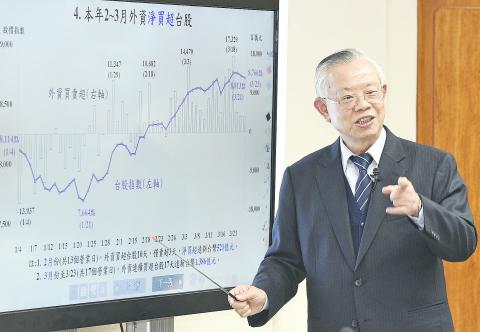The central bank yesterday cut its policy rates by 12.5 basis points and removed all credit controls on housing transactions, except for luxury homes, as the economy continued to deteriorate and housing transactions fell to a 14-year low.
The rate cut, the third since September last year, came after the economy slipped into a recession, with GDP contracting for the past two quarters, and looked set to remain in negative territory this quarter and beyond.
“A rate cut is favorable to maintaining financial stability and boosting confidence when exports fare poorer than expected amid global headwinds,” central bank Governor Perng Fai-nan (彭淮南) told a news conference after the bank’s quarterly board meeting.

Photo: Chen Chih-chu, Taipei Times
The central bank lowered the rediscount rate to 1.5 percent, the collateralized loan rate to 1.875 percent and the unsecured loan rate to 3.75 percent.
However, monetary policy alone cannot turn the economy around, and the public and private sectors should join forces in directing the nation’s excess savings to private investments, Perng said.
The Australia and New Zealand Banking Group (ANZ) said the latest rate cut could discourage capital inflows that have muted the New Taiwan dollar’s fall this year.
“The central bank is wary of capital inflows due to the monetary easing by peers in Europe and Japan,” Hong Kong-based ANZ economist Raymond Yeung (楊宇霆) said in a note.
Perng said he saw no need to keep various mortgage restrictions introduced since June 2010 because they have achieved their purpose of curbing property speculation.
The central bank had subjected houses in Taipei and 15 popular areas of New Taipei City to a mortgage ceiling of 60 percent due to their soaring prices in recent years. The restriction had also extended to multiple home owners and corporate buyers nationwide.
“Housing prices have corrected across the nation, with transactions last year plunging to the lowest level since the technology bubble burst in 2002,” Perng said.
However, the central bank is keeping the 60 percent cap for houses valued at NT$70 million (US$21.39 million) or more in Taipei, NT$60 million in New Taipei City and NT$40 million elsewhere, citing loan overconcentration among lenders.
“Internal data suggest a continued need for credit controls on luxury housings despite a sluggish market,” Perng said.
Luxury housing, especially in the capital, has borne the brunt of tightening measures, particularly a sharp increase in house taxes.
Sinyi Realty Inc (信義房屋), the nation’s only listed real-estate broker, said the loosened credit controls might introduce a healthy dose of confidence to the market without reviving property fever.
“The [central bank’s] sends a message, that the government is suspending policies that are unfavorable to the market,” Sinyi researcher Tseng Chin-der (曾敬德) said, adding that “sentiment should turn from negative to neutral.”
The central bank also scrapped a loan ceiling of 65 percent for land deals.

INVESTIGATION: The case is the latest instance of a DPP figure being implicated in an espionage network accused of allegedly leaking information to Chinese intelligence Democratic Progressive Party (DPP) member Ho Jen-chieh (何仁傑) was detained and held incommunicado yesterday on suspicion of spying for China during his tenure as assistant to then-minister of foreign affairs Joseph Wu (吳釗燮). The Taipei District Prosecutors’ Office said Ho was implicated during its investigation into alleged spying activities by former Presidential Office consultant Wu Shang-yu (吳尚雨). Prosecutors said there is reason to believe Ho breached the National Security Act (國家安全法) by leaking classified Ministry of Foreign Affairs information to Chinese intelligence. Following interrogation, prosecutors petitioned the Taipei District Court to detain Ho, citing concerns over potential collusion or tampering of evidence. The

NEGOTIATIONS: Taiwan has good relations with Washington and the outlook for the negotiations looks promising, Minister of Economic Affairs J.W. Kuo said Taiwan’s GDP growth this year is expected to decrease by 0.43 to 1.61 percentage points due to the effects of US tariffs, National Development Council (NDC) Minister Paul Liu (劉鏡清) said at a meeting of the legislature’s Economics Committee in Taipei yesterday, citing a preliminary estimate by a private research institution. Taiwan’s economy would be significantly affected by the 32 percent “reciprocal” tariffs slapped by the US, which took effect yesterday, Liu said, adding that GDP growth could fall below 3 percent and potentially even dip below 2 percent to 1.53 percent this year. The council has commissioned another institution

NEGOTIATIONS: The US response to the countermeasures and plans Taiwan presented has been positive, including boosting procurement and investment, the president said Taiwan is included in the first group for trade negotiations with the US, President William Lai (賴清德) said yesterday, as he seeks to shield Taiwanese exporters from a 32 percent tariff. In Washington, US Trade Representative Jamieson Greer said in an interview on Fox News on Thursday that he would speak to his Taiwanese and Israeli counterparts yesterday about tariffs after holding a long discussion with the Vietnamese earlier. US President Donald Trump on Wednesday postponed punishing levies on multiple trade partners, including Taiwan, for three months after trillions of US dollars were wiped off global markets. He has maintained a 10 percent

TRADE: The premier pledged safeguards on ‘Made in Taiwan’ labeling, anti-dumping measures and stricter export controls to strengthen its position in trade talks Products labeled “made in Taiwan” must be genuinely made in Taiwan, Premier Cho Jung-tai (卓榮泰) said yesterday, vowing to enforce strict safeguards against “origin laundering” and initiate anti-dumping investigations to prevent China dumping its products in Taiwan. Cho made the remarks in a discussion session with representatives from industries in Kaohsiung. In response to the US government’s recent announcement of “reciprocal” tariffs on its trading partners, President William Lai (賴清德) and Cho last week began a series of consultations with industry leaders nationwide to gather feedback and address concerns. Taiwanese and US officials held a videoconference on Friday evening to discuss the